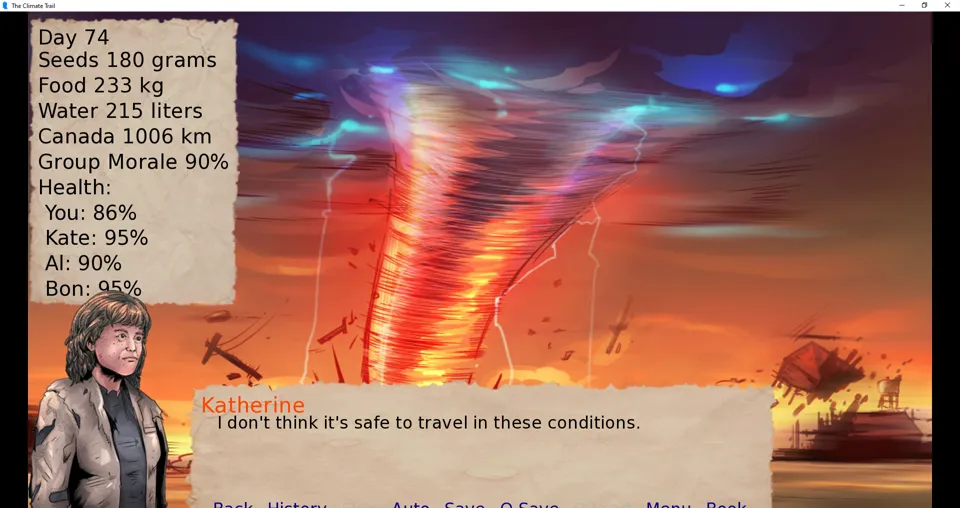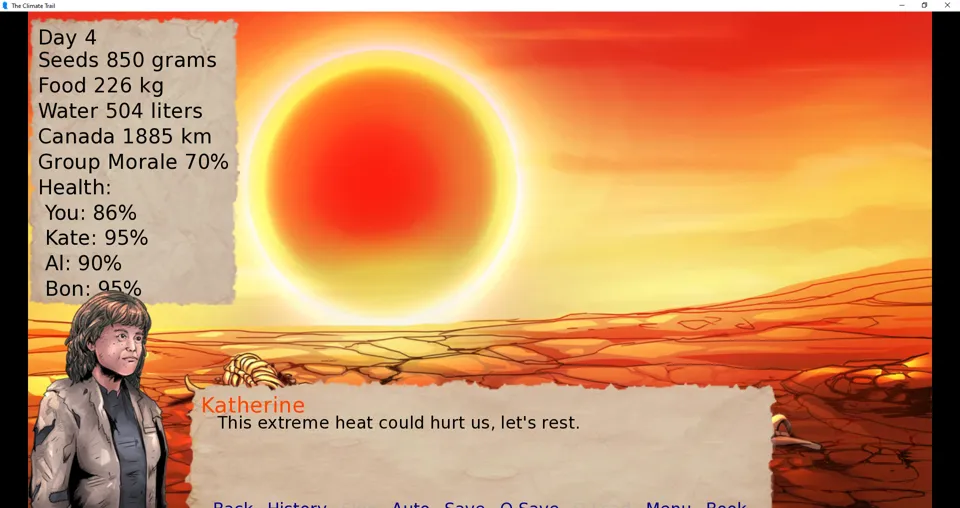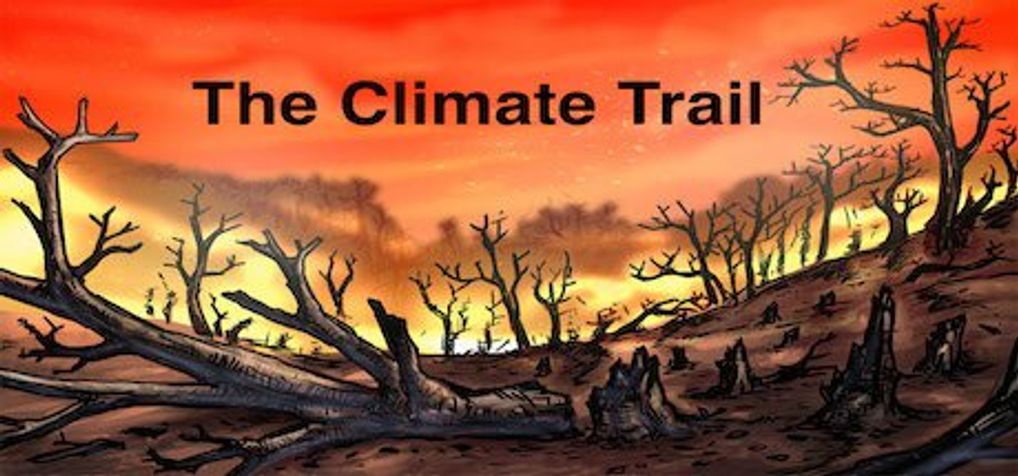Climate Trail
Games, at their heart, are a vehicle for escapism, though that escapism doesn’t always have to be a positive experience. For every Skyrim, letting us play out our fantasies of being powerful and meaningful, there is a Before Your Eyes reminding us of the impermanence of life and the fragility of our own existence. Through games, we explore a reality we may never get to see, but can at least imagine as our own. This escapism, I’d argue, is what lies at the heart of games. It’s what required to make them meaningful and experiences worth pursuing. A game that can’t achieve at least some level of immersion is not a successful game.
 No, Katherine, no it is not.
No, Katherine, no it is not.
The Climate Trail is a visual novel/survival game following a group of travelers trekking from Atlanta to Sault Ste. Marie in a climate change dystopia. The survivors must deal with balancing their supplies, harsh weather, and encounters along the trail, all while maintaining their health and morale.
The core gameplay is that of a visual novel. Players click through text boxes and make occasional decisions, but the heart of the gameplay lies in engaging with these travelers’ journey. The player is there to journey alongside Katherine, Albert, and Bonnie, to see the trail alongside them, and to try to make it to the greener pastures of Canada. The game relies on its story, augmented by light survival elements, to keep the player interested and engaged.
The Climate Trail also has another goal it’s trying to achieve. In telling this story of the trek to Canada, it seeks to present a vision of the future, one informed by science, and trying to educate the player on the reality of climate change. Climate change, The Climate Trail argues, is not a problem to be ignored or to be postponed. It is a global catastrophe that must be addressed immediately, lest the future it presents come to pass. It’s an important message.
 Pictured: Georgia
Pictured: Georgia
Every visual novel relies on the power of its story to keep the player engaged. For those that mix in other elements - like Ambition or Citizen Sleeper - these elements serve to augment the story and provide the player with a way to guide the story in the direction they want to explore further. While blending survival elements into a visual novel definitely seems like it could work, it requires that the player already be invested in the story and sufficiently immersed that the threat of death feels meaningful.
The Climate Trail doesn’t do that. From the flat characters to the flat setting, there is nothing in this game that invites immersion. The characters are not characters, but vehicles for statements about risk or exposition. The world doesn’t vary, with the same three or four events playing over and over again. Survival never truly feels like it’s up to the player; the party survives or doesn’t based on the outcome of the loop, and that outcome has no real meaning, since the story never felt real in the first place.
 Oh, and sometimes the game crashes.
Oh, and sometimes the game crashes.
In some ways, this might reflect a greater narrative about the reality of the impact of climate change. The reality of climate change is that the brunt of it is not borne by you or me, but by those who come after. The world we leave to the next generation is the one that will see the horrors my generation and those before me have unleashed. It is they who will see the apocalypse, through no fault of their own. Their choices don’t matter. Their path is already set, and all they can do is move through it, waiting to see how it plays out. If want to talk about immersion and how to create an immersive experience, then feeling powerless to do anything but read what is going to happen to me feels like a pretty fair way to accomplish a sense of what climate change will do.
Of course, it also doesn’t make for a very compelling or fun game.
There are ways to make a game like this work. The developer repeatedly draws on the analogy of Oregon Trail. I, like many others, grew up with Oregon Trail. What made it compelling, though, was less the knowledge that I was on a journey and what awaited me on the other end, but rather, what I found along the way and the choices I faced to get there. Oregon Trail was filled with logistics decisions of what to put in my wagon, interesting characters to meet and learn about, and a dynamic world that felt real. It didn’t have the same three events, cycling over and over. Instead, it created a version of history that asked the player to use their imagination to fill in the gaps, providing them with the tools and material to do so.
Somewhere, buried beneath flat writing, The Climate Trail has potential to be something more interesting. With the addition of more events and more variety on the trail, there’s the potential for a good story, and one that can effectively convey the horrors of climate change. Instead, what this game left me thinking about was my carbon footprint while playing it and writing this review (~13kg CO2), and whether that footprint was worth it.
Developer: William Volk
Genre: Visual Novel, Survival
Year: 2019
Country: United States
Language: English
Play Time: 30 Minutes - 1 Hour
Youtube: https://youtu.be/Iq8AvwA_1dc
